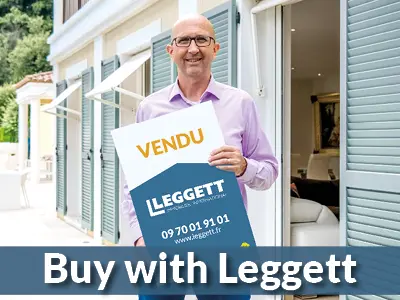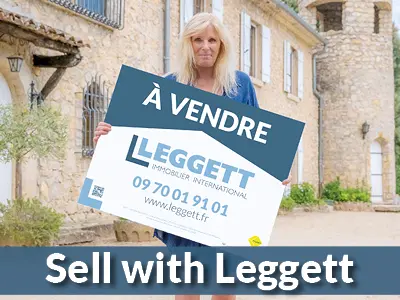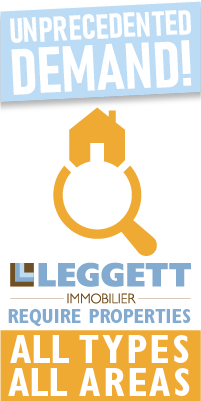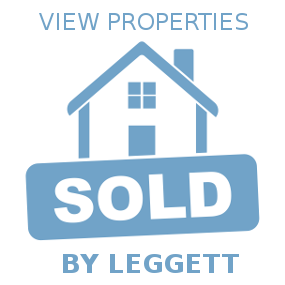How to sell your French property
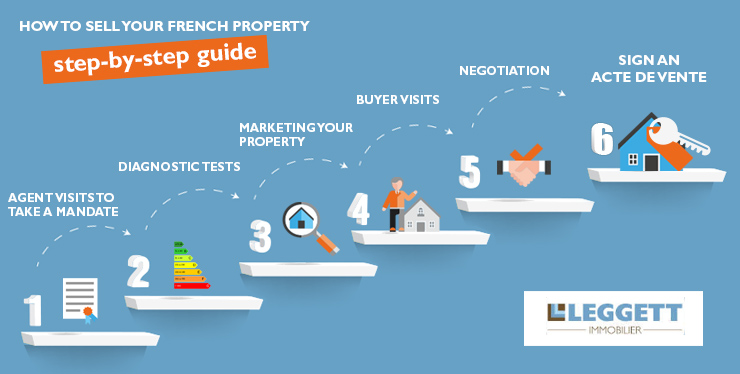
- Step 1. Agent visits to take a mandate
- Step 2. Diagnostic tests
- Step 3. Marketing your property
- Step 4. Buyer visits
- Step 5. Negotiation and signing a Compromis de Vente
- Step 6. Sign an Acte de Vente
Leggett Immobilier have helped thousands of clients to sell property in France over the past two decades. The selling process is fairly straightforward and in this guide we aim to give you an overview of how the process works. Our short video guide will talk you through the entire process - or you can read the more detailed step-by-step guide below.
 Our agent comes to you
Our agent comes to you
Our agent will come to you at home to take the mandate as all of our agents work and live in the locality which gives them an extensive knowledge of the local property market. This knowledge is essential when giving you expert advice on the current property market but which also allows for a more accurate valuation and expected selling timescale.
It’s a simple process. Your Leggett agent will:
 Assess the size and total number of rooms at the property
Assess the size and total number of rooms at the property Discuss price and pricing strategy
Discuss price and pricing strategy Discuss the compulsory DPE and diagnostic tests
Discuss the compulsory DPE and diagnostic tests Take details for [Mandate de Vente](link to legal documents page) - a document which allows us to put your property on the market
Take details for [Mandate de Vente](link to legal documents page) - a document which allows us to put your property on the market Take photographs and details of property
Take photographs and details of property
Our agents will photograph your property to show its full potential. The photos of the exterior of your property may require a further visit if the weather is not good. We will also use interior lights and other techniques to create that all important first impression. Your agent will discuss any legal issues that have to be included in the mandate, such as droits de passage (rights of way) across your property, and help you organise the various tests required before a sale can proceed. Once you have agreed a valuation, we’ll send you a sales [document called a “Mandat de Vente”](link to legal documents page). Because we’re in France, this document is in French, but we will also provide an English translation if needed. All you need to do is simply sign the document and return it to our in-house mandate team.
 Diagnostics tests
Diagnostics tests
Houses may not be listed for sale in France without certain compulsory property surveys carried out by approved experts. It is the seller’s responsibility to have these tests completed.
Diagnostique de Performance Energétique (DPE)
Before marketing your French property, you are required to have a Diagnostique de Performance Energétique (DPE) undertaken by an approved specialist.Whether you are selling through an estate agent or privately, the test results must be displayed within the listing.This test provides information about energy consumption, greenhouse gas emissions, levels of insulation and other factors which may affect heating bills.
Dossier Diagnostic Technique
The Dossier Diagnostic Technique (DDT) tests should be conducted ASAP, you don’t need to include the results with the listing. But, the surveys may highlight any potential issues which can be resolved or explained to potential buyers.
The Dossier Diagnostic Technique tests include:
 Lead and Asbestos: Paint is tested for lead content on all properties built before 1949, and all properties built before 1997 are tested for asbestos
Lead and Asbestos: Paint is tested for lead content on all properties built before 1949, and all properties built before 1997 are tested for asbestos Gas (fixed only) and Electricity: If gas or lectricity was installed or renewed in the property in the 15 years prior, both need to be checked for suitability.
Gas (fixed only) and Electricity: If gas or lectricity was installed or renewed in the property in the 15 years prior, both need to be checked for suitability. Natural risk and parasites: Properties are evaluated for natural risks (e.g. flooding) and for any risks posed by industry in the area. Properties in areas known to be affected by parasites such as termites (which can damage buildings), are tested.
Natural risk and parasites: Properties are evaluated for natural risks (e.g. flooding) and for any risks posed by industry in the area. Properties in areas known to be affected by parasites such as termites (which can damage buildings), are tested. Surface area: Flats and apartments, or properties which are part of a shared building, are measured to confirm exactly what is included in the sale.
Surface area: Flats and apartments, or properties which are part of a shared building, are measured to confirm exactly what is included in the sale.  Swimming pool security: A conformity certificate for the security features. If the vendor cannot provide this then they will need to provide a report from a diagnostics company.
Swimming pool security: A conformity certificate for the security features. If the vendor cannot provide this then they will need to provide a report from a diagnostics company.  Smoke alarms: All properties must have a smoke alarm.
Smoke alarms: All properties must have a smoke alarm.  Sewerage: Many rural properties in France are not on mains drains and instead have a ‘fosse septique’ (septic tank) which must conform to legal, listed requirements. Where properties are connected to mains drains, a certificate confirming this will be required (this can be provided by the local town hall). It often takes a while to obtain septic tank reports which may delay a sale and a late, bad result may result in losing the sale so you are strongly advised to get this test done as soon as possible. Your Leggett Immobilier agent can help you to organise a test.
Sewerage: Many rural properties in France are not on mains drains and instead have a ‘fosse septique’ (septic tank) which must conform to legal, listed requirements. Where properties are connected to mains drains, a certificate confirming this will be required (this can be provided by the local town hall). It often takes a while to obtain septic tank reports which may delay a sale and a late, bad result may result in losing the sale so you are strongly advised to get this test done as soon as possible. Your Leggett Immobilier agent can help you to organise a test.
Most of these tests are for the buyer’s information only. However, some issues may need to be dealt with immediately, for instance swimming pool security needs to meet requirements before the property is advertised. Parasite issues need to be addressed by either the vendor or the purchaser as negotiated. Septic tank problems are in the remit of the purchaser and they are obliged to ensure correction within a year of purchase. This may involve installing a new system which is costly and is likely to cause problems with the sale if the information is not made available up front.
In France, sellers are not obliged to include a structural survey, in fact its rare to have one done and if required, it’s is the buyer’s responsibility to organise and pay for it.
 Marketing your property
Marketing your property
The goal of listing your property is to promote it to as many potential buyers as possible and this is why Leggett Immobilier is the best placed to market your property. With an award winning Head Office team, we’ve been marketing properties online and in print for more than 20 years, and in that time we’ve created an extensive network of assets and partners to ensure that your property can be seen by the highest number of potential buyers possible
Our Leggett Immobillier’s websites receive more than 2.8 million visits per year by potential buyers from across the globe. We also have specialist sites dedicated to prestige properties and ski properties.
These sites, together with our mobile app, social media accounts, email campaigns and multiple national and international portal listings allow you to maximise the reach of your property listing to increase your visibility in the market place .
In addition to our digital assets we have an active presence offline too. We also participate in property exhibitions, press coverage, advertisements, TV and radio programming, media partnerships and a whole host of sponsorship and other marketing opportunities.
 Buyer visits
Buyer visits
Some vendors enjoy visits from potential buyers and others don’t. The thing to remember is that Leggett agents are trained and experienced in showing property. They are the best person for the job and it is good to let them get on with it. There are things that you can do that will help with the preparation of your property for to make it seem like someone’s dream. We’ve used our wealth of experience to put together a collection of ‘top tips’ to help.
 Negotiation and signing a compromis de vente
Negotiation and signing a compromis de vente
Once an offer to buy your property is made, your Leggett agent will handle the negotiations on your behalf, ensuring that the sale progresses as smoothly as possible including negotiating any pre-sale conditions the buyer requires such as planning permission or mortgage application. These are common requests and can easily be included in the sales paperwork.
Upon agreement with your agent, your agent can assist and advise, where possible on the necessary documentation and draw up your Compromis de Vente. They will liaise with the notaire and the Leggett in-house contracts team to ensure a smooth transition through to the completion of your sale.
 Sign an Acte de Vente
Sign an Acte de Vente
Usually around three - four months after the signing of the Compromis de Vente, the notaire will have undertaken all of the necessary work and you will have agreed a date for the final signing of the Acte de Vente. This will usually take place in France, at the notaire’s office. Once this final document is signed, you will hand over ownership (and keys) of your property to the new owner.
Before this meeting the notaire will ensure that the balance of funds to complete the purchase is in their bank account, this includes any funds which are being paid by a mortgage company. You will be required to provide the notaire with a IBAN to enable him/her to transfer funds (minus taxes and any mortgage repayments or Capital Gains Tax you may have to pay) to your account.
Congratulations, you have successfully sold your French property!










